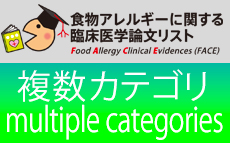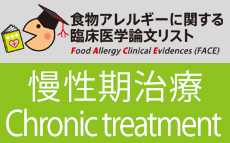Oral immunotherapy for IgE-mediated cow's milk allergy: a systematic review and meta-analysis.
更新日:2016年10月21日
| Author: | Brożek JL, Terracciano L, Hsu J, Kreis J, Compalati E, Santesso N, Fiocchi A, Schünemann HJ. |
|---|---|
| Title: | Oral immunotherapy for IgE-mediated cow's milk allergy: a systematic review and meta-analysis. |
| Citation: | Clinical & Experimental Allergy. 2012 Mar;42(3):363-74. doi: 10.1111/j.1365-2222.2011.03948.x. |
| URL: | https://pubmed.ncbi.nlm.nih.gov/22356141/ |
| Abstract: | Cow's milk is a common cause of food allergy in children. Children usually outgrow cow's milk allergy by the age of 3-5 years, but some will have persistent symptoms beyond childhood. We performed a systematic review of randomized controlled trials (RCTs) and observational studies to assess the evidence supporting the use of oral immunotherapy in IgE-mediated cow's milk allergy to inform the World Allergy Organization guidelines. Of 1034 screened articles published until May 2011, five RCTs and five observational studies fulfilled a priori specified inclusion criteria. RCTs including 218 patients showed that oral immunotherapy, compared to elimination diet alone, increased the likelihood of achieving full tolerance of cow's milk [relative risk: 10.0 (95% CI: 4.1-24.2)]. Adverse effects of immunotherapy include frequent local symptoms (16% of doses), mild laryngospasm [relative risk: 12.9 (1.7-98.6)], mild asthma [rate ratio: 3.8 (2.9-5.0)], reactions requiring oral glucocorticosteroids [relative risk: 11.3 (2.7-46.5)] or intramuscular epinephrine injection [rate ratio 5.8 (1.6-21.9)]. Results of observational studies were consistent with those of RCTs. Despite the availability of RCTs, the overall low quality of evidence leaves important uncertainty about anticipated effects of immunotherapy due to very serious imprecision of the estimates of effects and the likelihood of publication bias for some of the critical outcomes. A potentially large benefit of oral immunotherapy in patients with cow's milk allergy may be counterbalanced by frequent and sometimes serious adverse effects. Additional, larger RCTs measuring all patient-important outcomes are still needed. |
| 邦文タイトル: | IgE関連の牛乳アレルギーに対する経口免疫療法:系統的レビューとメタ解析 |
| 一般向け要約 | 牛乳は、子供の食物アレルギーの主な原因のひとつである。3-5歳までに自然に治ることが多いが、一部の子供ではそれ以降も症状が続く。そこでIgE関連の牛乳アレルギーに関する経口免疫療法の介入研究と観察研究を系統的レビューした。 2011年5月までに発表された1034論文から基準を満たす5つの介入研究と5つの観察研究を選択した。介入研究に参加した患者の合計は218人で、完全除去を続けた場合と比較して、経口免疫療法を行うと牛乳が摂取可能になった人は10倍いた。経口免疫療法をした人では摂取した回数の16%で副作用がおこっていた。完全除去を続けた場合と比較した副作用の危険性は、軽度の喉頭けいれん13倍、軽度の喘息発作4倍、ステロイド内服をが必要とする症状11倍、アドレナリン注射(エピペン)を必要とする症状6倍であった。観察研究の結果も同じようなものだった。経口免疫療法は効果が大きい一方で、頻繁に(時には重大な)副作用を伴っていた。患者目線で結果を評価するような介入研究が今後もさらに必要である |
| 専門医コメント | 牛乳アレルギーに経口免疫療法(いわゆる減感作)をしたらどれくらい効果と副作用があったかをまとめた論文です。この系統的レビューでは完全除去よりも経口免疫療法をすると150ml飲める人が10倍になるという非常に高い結果がでました。5ml以上飲める人という緩い基準にしても5倍の結果だったようです。しかし一方で経口免疫療法をすることによる副作用も多く、アドレナリン注射を必要とするような重症な副作用の危険性も高いことが示されています。 |


